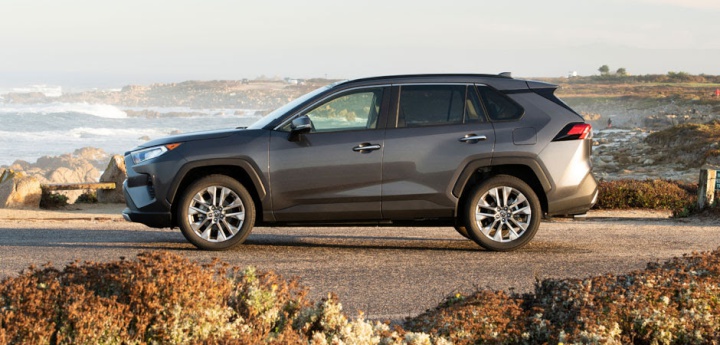2019 RAV4 redefines adventurous attitude
FRIDAY, MARCH 1, 2019

Toyota RAV4 has
always combined a go-anywhere attitude, performance
capability, and compact dimensions with handling that is
agile and dynamic.
The 2019 RAV4 enhances past
generations with a brave new attitude that redefines
adventure through energising design, improved performance
and advanced safety.
“The RAV4 has been a pioneer since it was revealed in 1989 at the Tokyo Motorshow,” says Neeraj Lala, Toyota New Zealand’s General Manager of Product and New Vehicle Sales.
“It introduced a new kind of car to the world, one that has set the benchmark for SUV adventure and on-road refinement over the past 4 generations.”
“25 years later, the fifth generation has the same pioneering spirit with the best safety systems, improved performance, and adventurous styling.”
“To set a new benchmark the RAV4 has needed to evolve with the addition of smart technologies that ensure an enjoyable adventure experience,” says Mr Lala.
The all-new Toyota RAV4 will offer an advanced safety package across the entire eight-variant range when it goes on sale in April 2019.
As part of its leading Toyota Safety Sense suite of features, every variant in the line-up will incorporate dynamic radar cruise control, a pre-collision system with autonomous emergency braking including pedestrian detection and daylight cyclist detection, road sign assist, lane tracing assist and automatic high beam.
Other advanced safety technologies including blind-spot monitor, rear cross-traffic alert, reversing camera, front and rear parking sensors and seven airbags further contribute to the new RAV4's very high level of standard safety features.
“Advanced safety technology should not only be available on the top grades,” says Mr Lala.
“Customers want to know they can have adventurous fun in their RAV4 with peace of mind that they have the best safety technology in their vehicle for when they need it.”
For the first time in New Zealand, Toyota will offer a self-charging hybrid-electric RAV4 - available in three grades - with its no compromise 155kW 2.5-litre petrol-electric powertrain mated to an electronically-controlled continuously variable transmission (E-CVT).
It continues the electrification of Toyota’s total range of models, which are all expected to offer an electrified option by 2025.
Since introducing the first mass-production petrol-electric hybrid vehicle, the Prius, 22 years ago, Toyota has continually refined and upgraded its hybrid technology.
The 2019 RAV4 hybrid driver will notice a linear acceleration feel, thanks to the distribution of more driving force to the rear wheels with the introduction of a newly developed E-Four system, helping suppress front wheel slip during off-the-line starts for optimal acceleration performance and stability.
The E-Four system also helps reduce understeer during cornering for enhanced steering stability. Off-road, the increased rear-wheel torque helps provide powerful hill-climbing performance, even on rough terrain.
The new RAV4 can even coach the driver toward achieving better fuel economy. An accelerator guide function suggests an acceleration amount to the driver according to the driving conditions, and a scoring function adds a measure of fun to eco driving.
Driving enthusiasts will appreciate the four driving modes - EV in the hybrid, Normal, Eco and Sport - with the latter enhancing the car's acceleration.
A new 2.5-litre, four-cylinder engine providing 152kW maximum power and 243Nm of maximum torque features in the AWD petrol variants combined with an eight-speed automatic transmission.
There is also a new 2.0-litre petrol engine and direct shift-CVT combination.
At the entry level are the urban-oriented front-wheel-drive 127kW/203Nm 2.0-litre petrol variants offered in GX, GXL and Limited grades.
The top of the line Adventure AWD model is powered by the new 2.5-litre petrol engine and uses a Toyota first Dynamic Torque Vectoring AWD system. This new 2.5-litre engine is also available in a non-hybrid GXL model.
“All-wheel drive may have become a ubiquitous term in the automotive industry, especially among SUVs, but not all AWD systems are the same,” says Mr Lala.
The new all-wheel drive system will send up to 50 per cent of the torque to the rear axle and the differential can then send it in varying amounts to the individual wheels.
Mr Lala said with the new RAV4, Toyota was catering to a range of customers who are increasingly looking at SUVs for their practical flexibility for urban use as well as those who enjoy the occasional weekend adventure off the tarmac.
-Ends-


 Vegetables New Zealand: Asparagus Season In Full Flight: Get It While You Still Can
Vegetables New Zealand: Asparagus Season In Full Flight: Get It While You Still Can  Bill Bennett: Download Weekly - How would NZ telecoms cope with another cyclone
Bill Bennett: Download Weekly - How would NZ telecoms cope with another cyclone NZ On Air: Firm Audience Favourites Lead NZ On Air Non-Fiction Funding
NZ On Air: Firm Audience Favourites Lead NZ On Air Non-Fiction Funding Insurance and Financial Services Ombudsman: Woman Gets $40k More After Disputing Insurer’s Decision
Insurance and Financial Services Ombudsman: Woman Gets $40k More After Disputing Insurer’s Decision BNZ: A Quarter Of Older NZers Fear Going Online Due To Scam Concerns
BNZ: A Quarter Of Older NZers Fear Going Online Due To Scam Concerns University of Auckland: Scientists Develop Tool To Monitor Coastal Erosion In Fine Detail
University of Auckland: Scientists Develop Tool To Monitor Coastal Erosion In Fine Detail



